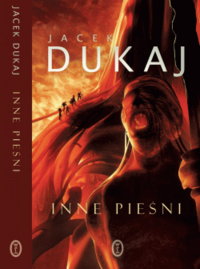- Inne pieśni
-
Inne pieśni 
Polish edition cover.Author(s) Jacek Dukaj Original title Inne pieśni Translator not translated Cover artist Tomasz Bagiński Country Poland Language Polish Genre(s) Fantasy/Science fiction novel Publisher Wydawnictwo Literackie Publication date 2003 Pages 650 pp ISBN ISBN 83-08-03481-0 OCLC Number 54357458 LC Classification PG7163.U4 I56 2003 Inne pieśni (Other Songs) is a novel written in 2003 by Jacek Dukaj, Polish science fiction writer and published in Poland by Wydawnictwo Literackie. The novel is a mixture of fantasy, alternate history and science fiction. The novel received the prime Polish award for sci-fi literature, Janusz A. Zajdel Award, in 2003.
Contents
Universe
The universe of the book is similar to ours with one major exception: instead of laws of physics as known to us, the universe is ruled by Aristotle's metaphysics, and to a lesser extent by Hegelian philosophy. There are no atoms or other particles, just five elements. All Matter is composed of those five elements, mixed in proportions determined by the Form. Every Substance is fulfilling its ideal Form, morphe, which "exists" separately from the Matter, hile, but appears only in Substance. There's no evolution in nature. Nature is teleological and has a purpose. The Sun and all the planets are circling Earth, and they move not in vacuum but in aether. Diseases are the signs of mind's insanity, the weakness of Form.
Forms determine Matters, and human will can change Forms. Thus, the human mind is able to shape reality in indirect way, to some degree, and most powerful minds have large area effect — their anthos (auras, fields of influence) can affect entire lands. The Earth is divided into dozens of dominions, each under the pressure of Form of kratistos (man) or kratista (woman): individuals having the most powerful Forms; their anthos influences culture, language, law of whole nations, even biology of animals and plants there. Having entered the domain of kratistos, one gradually finds it more and more natural to behave like him, to look like him, to think like him — to be him. People with a weaker form can be easily dominated by those with a more powerful Form. In the aura of a despot everyone is a little more egoistic and harsh; in the aura of a hedonist everyone is a little prettier and sensual. Travelers will be affected by the anthos, acquiring attributes of the land they enter, up to and including its language. People can try to train their anthos, and there are specializations of personal auras — for example in the presence of ares — a natural born warrior — everything is a deadly weapon and an accidental punch can be a devastating blow.
Plot introduction
Twelve centuries have passed since the fall of Rome; fewer since the death of Kristos (Christ). Hieronim Berbelek was once a powerful strategos (a natural born leader whose form makes other people listen to him or her), but when he was defeated by one of the kratistoses, known as the Sorcerer, his Form and spirit were broken, reduced to those of a lowly merchant, a sad, small man, easily molded by others with stronger Forms. However, a chain of events sets him off on a journey — first to Africa, and later into many new lands, from the depths of Sorcerer's domain, through the fabled Library of Alexandria and mysterious flying city, to the Moon colony, and on this journey he may have a chance of regaining his Form…
Influence and interpretation
Dukaj's primary influence have been the philosophical concepts of Aristotle and Hegel. Coupled with his experiences in science fiction, the resulting book is hard to put into any normal genre, leading many to describe it as a kind of 'philosophical fiction' or 'sophia fiction'. Philosophical, because Dukaj introduces an overwhelming array of philosophical concepts, but also fiction: the book has no essays or lengthy monologues, it is full of action and colorful characters.[citation needed]
The entire concept of Form is heavily influenced by the work of Witold Gombrowicz.[citation needed]
See also
Footnotes
References
- This article incorporates information from the revision as of 12 July 2006 of the equivalent article on the Polish Wikipedia.
Categories:- 2003 novels
- Alternate history novels
- Science fantasy novels
- Philosophical novels
- Polish science fiction novels
- 2000s science fiction novels
Wikimedia Foundation. 2010.
